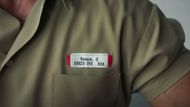Cocaine Quarterback: Signal-Caller to the Cartel is a documentary crime series that premiered on September 25, 2025, on Prime Video. The limited docuseries is a one-season, three-episode production of Unrealistic Ideas, a company owned by Mark Wahlberg, and directed by Jody McVeigh-Schultz.
The series tells the real-life story of Owen Hanson, a former USC football player whose switch from college sports to high-stakes crime not only shocked the sports world but also the world of law enforcement.
It traces the journey of Hanson from his simple life as a walk-on tight end at the USC football powerhouse to his descent into organized crime, where he becomes a bookie and a drug mule for the infamous Sinaloa cartel.
The narrative features interviews with police, ex-business partners, and Hanson himself, in a dramatic demonstration of how his pursuit of wealth and power turned into a life-threatening business venture, ultimately resulting in a dramatic FBI arrest and federal prosecution.
Is Cocaine Quarterback: Signal-Caller for the Cartel based on a true story?

Cocaine Quarterback: Signal-Caller to the Cartel is based on a true story, and its material is well-documented by federal authorities and investigative journalists, as seen in the documentary. The series traces the criminal ascent and ultimate incarceration of an ex-USC football walk-on, Owen Hanson, who left college sports to pursue a criminal life involving drugs, illegal betting, and international money laundering.
Hanson’s story is not only dramatized but pulled from FBI files, trials, and eyewitness testimonies of those who were involved in the law enforcement operations against him.
Speaking with The Credits, McVeigh-Schultz, the director, revealed:
“I had conversations with him while he was in prison… I was impressed that Owen was so open about the things he did, even the things he wasn’t proud of.”
When asked about the format for the show and how they decided on keeping it to 3 episodes, Schultz added:
“This could have been six episodes, but I think it wouldn’t have been as compelling. You want to ramp up the tension, the stakes, each time he gets into a bind. Owen had a whole early career building an offshore sports betting business, which was interesting. But for us, it was about how to tee up the most amazing part of his story, which was this incredible money laundering scheme in Australia, where he loses $2.5 million and everything goes incredibly wrong.”
The FBI has also publicly detailed Hanson’s organization: he organized a network of bookies, private investigators, enforcers, and runners to operate his multi-million dollar sports gambling and drug trafficking business, including recorded cases of intimidation, violence, and the trafficking of thousands of kilograms of cocaine and methamphetamine in the United States, Australia, and beyond.
Cocaine Quarterback stands apart not only in its direct access to Hanson himself but also to co-conspirators and investigators, which offers an unpolished view of how Hanson used his relationships in USC and the sports world to feed and sustain his criminal operations.
As director, Schultz explains to The Credits:
“Once you get a full picture and get several people saying what Owen’s saying may not be the truth, you can begin to piece together the most honest telling of this story from multiple perspectives.”
Major news websites, such as Deadline, Yahoo Sports, and Bleacher Report, have confirmed the account of Hanson, who was arrested after a massive undercover operation and later convicted on drug, gambling, and money laundering charges by a federal court.
The case of Hanson resulted in over 21 of his associates being charged and convicted, and also served as the focus for chapters in the nonfiction book Dark Wire by Joseph Cox, which further substantiates what happened in Cocaine Quarterback.
As court records and sentencing memos attest, Hanson received a sentence of more than 21 years in prison, including the forfeiture of millions of dollars in criminal assets, many facts on which the series' narrative revolves.
According to the Bleacher Report, Owen Hanson has been released from prison. In March 2024, he was released early after less than seven years of his original 21-year sentence. After being released, he was put in a halfway house in Southern California and remained under monitored parole.
His release was finalized in late June 2025, and even though he can now live without staying at the halfway house, he remains under parole and under federal surveillance.
The Mob Museum reports that Hanson has since launched a business known as California Ice Protein and lives in Los Angeles as he struggles to regain his life and considers his time in prison as a new beginning.
Notably, Schultz went on to say:
“We got very lucky that he was released during the time we were in production… there’s a real ambivalence with his loved ones about whether he’s going to change.”
